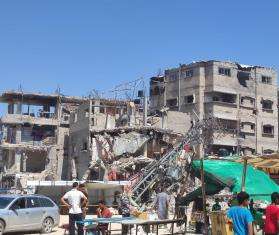BRUSSELS/ROME—A crisis of human suffering is being created at Europe’s borders as thousands of people risk life and limb to reach safety with little or no assistance, the international medical humanitarian organization Doctors Without Borders/Médecins Sans Frontières (MSF) said today, warning of the consequences of EU member states ignoring their humanitarian duty.
Ahead of the June 25-26 European Council meeting, MSF is calling on EU leaders to offer safe and legal ways for people to seek refuge and asylum in Europe. Specifically, EU leaders must immediately deploy adequate resources to enable Greece and Italy to effectively ensure proper protection and humane reception conditions at arrival points. The governments of Italy and Greece also must improve conditions for migrants and asylum seekers arriving at their borders.
“This is an orchestrated humanitarian crisis, created by the failure of the European Union to put in place adequate and humane policies and practices to deal with this issue,” said Aurelie Ponthieu, MSF migration advisor. “The deteriorating situation is not due to unmanageable numbers of migrants and refugees. It is a direct result of chronic shortcomings in the European Union’s policies in handling the new arrivals. Member states spend their time talking about closing borders, building fences, and issuing threatening ultimatums to each other. That will not stop people coming, and will just undermine any collaborative efforts to assist people in need”.
Key EU member states have taken an even more hardline position. France and Austria have reinforced border controls, Italy has threatened to prevent foreign boats from disembarking migrants, and Hungary has announced a wall on its border with Serbia.
MSF’s data from its projects for migrants in Italy and Greece reveal that the majority of medical conditions are related to poor reception conditions, as well as to wounds and trauma suffered during long and dangerous journeys. Because health needs are not being addressed adequately by the authorities, MSF provides medical services and mental health support.
“The current system is clearly not working,” said Loris de Filippi, president of MSF-Italy. “Returning vulnerable people to Italy under the Dublin regulation should be immediately suspended. Urgent action should be taken to allow asylum seekers entering though the EU’s southern borders to receive the assistance and protection they are entitled to, according to EU directives.”
The reception system in Italy is under strain and will collapse in the next few weeks if no action is taken. Reception centers in Sicily struggle to provide adequate and humane conditions, while hundreds of refugees in transit are massing in informal settlements in Italy’s main cities and at the French border in Ventimiglia, where MSF is responding to basic needs.
Greece is dealing with a significant increase in refugee arrivals, but the reception system is almost non-existent, and conditions are increasingly worrying. On the island of Kos, MSF is the only organization providing medical care and improving living conditions inside the Captain Elias camp, composed of a dilapidated building. It is the only place made available by authorities for refugees and migrants to stay while awaiting permission from the police to leave the island, which can take several weeks.
Following the death of over 1,800 people this year, funding for search and rescue operations at sea has tripled over the past month. However, very little has been done to provide assistance and to improve proper reception conditions.
“We want to see the same determination to put in place dignified and humane reception conditions in Europe,” said Ms. Ponthieu. “Instead of arguing over solidarity amongst member states, it is time for the EU to take concrete action to help people fleeing terrible humanitarian crises and to agree on policies that are effective, humane, and based upon compassion for people, rather than on a hostile discourse of institutional rejection.”





